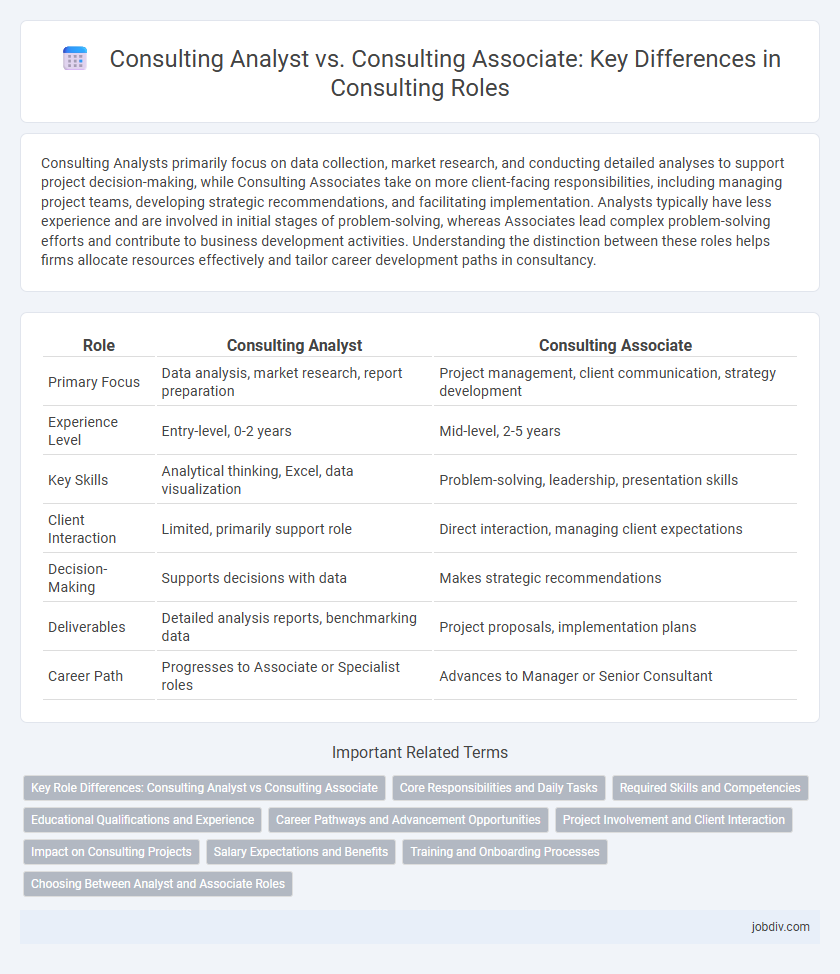Consulting Analysts primarily focus on data collection, market research, and conducting detailed analyses to support project decision-making, while Consulting Associates take on more client-facing responsibilities, including managing project teams, developing strategic recommendations, and facilitating implementation. Analysts typically have less experience and are involved in initial stages of problem-solving, whereas Associates lead complex problem-solving efforts and contribute to business development activities. Understanding the distinction between these roles helps firms allocate resources effectively and tailor career development paths in consultancy.
Table of Comparison
| Role | Consulting Analyst | Consulting Associate |
|---|---|---|
| Primary Focus | Data analysis, market research, report preparation | Project management, client communication, strategy development |
| Experience Level | Entry-level, 0-2 years | Mid-level, 2-5 years |
| Key Skills | Analytical thinking, Excel, data visualization | Problem-solving, leadership, presentation skills |
| Client Interaction | Limited, primarily support role | Direct interaction, managing client expectations |
| Decision-Making | Supports decisions with data | Makes strategic recommendations |
| Deliverables | Detailed analysis reports, benchmarking data | Project proposals, implementation plans |
| Career Path | Progresses to Associate or Specialist roles | Advances to Manager or Senior Consultant |
Key Role Differences: Consulting Analyst vs Consulting Associate
Consulting Analysts primarily focus on data gathering, analyzing market trends, and preparing reports that support strategic decision-making. Consulting Associates take on greater client interaction responsibilities, lead project components, and translate analytical findings into actionable business strategies. The key role differences lie in the level of project ownership and client engagement, with Associates managing broader scopes and Analysts concentrating on detailed analytical tasks.
Core Responsibilities and Daily Tasks
Consulting Analysts primarily focus on data gathering, market research, and initial problem analysis, supporting project teams with detailed reports and presentations. Consulting Associates take on greater client-facing responsibilities, managing project timelines, synthesizing insights, and driving decision-making processes to ensure deliverable quality. Both roles require strong analytical skills, but Associates typically lead day-to-day project execution and facilitate communication between clients and senior consultants.
Required Skills and Competencies
Consulting Analysts require strong analytical abilities, proficiency in data interpretation, and foundational skills in problem-solving and communication to support project deliverables effectively. Consulting Associates must demonstrate advanced project management capabilities, client relationship skills, and strategic thinking to lead initiatives and drive business solutions. Both roles demand adaptability, industry knowledge, and teamwork, but Associates typically require deeper expertise and leadership competencies.
Educational Qualifications and Experience
Consulting Analysts typically hold a bachelor's degree in business, finance, or related fields and possess 1-3 years of experience in data analysis or market research. Consulting Associates often require a master's degree, such as an MBA, combined with 3-5 years of experience in client management, strategic planning, and project execution. The Consultant Associate role demands a deeper understanding of industry trends and stronger leadership skills compared to the more entry-level, analytical focus of the Consulting Analyst position.
Career Pathways and Advancement Opportunities
Consulting Analysts typically begin their careers conducting research, data analysis, and supporting project teams, laying the groundwork for promotion to Consulting Associate roles where responsibilities expand to managing client interactions and project deliverables. Advancement opportunities from Analyst to Associate often involve demonstrating strong analytical skills, business acumen, and effective communication, with Associates positioned for further growth into Senior Consultant or Project Manager roles. Career pathways emphasize skill development in strategy, stakeholder management, and leadership to accelerate progression within consulting firms.
Project Involvement and Client Interaction
Consulting Analysts primarily focus on data gathering, market research, and preliminary analysis to support project development, often working behind the scenes with limited direct client interaction. Consulting Associates take on a more active role in project management, synthesizing insights, delivering presentations, and engaging directly with clients to address strategic concerns. The escalation from Analyst to Associate involves increased responsibility in client communication and deeper involvement in shaping project outcomes.
Impact on Consulting Projects
A Consulting Analyst primarily supports data gathering, market research, and preliminary analysis, providing foundational insights that shape strategic recommendations. Consulting Associates take a more active role in project management, synthesizing data to develop actionable solutions and directly influencing client decision-making. The progression from Analyst to Associate enhances the depth of impact on consulting projects by combining analytical rigor with strategic leadership.
Salary Expectations and Benefits
Consulting Analysts typically earn entry-level salaries ranging from $60,000 to $80,000 annually, with benefits including performance bonuses, health insurance, and professional development opportunities. Consulting Associates usually receive higher compensation, often between $80,000 and $110,000 per year, alongside enhanced benefits such as stock options, leadership training programs, and expanded healthcare plans. Salary growth and benefit packages for Associates reflect increased responsibilities and experience compared to Analysts within consultancy firms.
Training and Onboarding Processes
Consulting Analysts undergo rigorous training focused on data analysis, market research, and foundational consulting methodologies to build core skills essential for project support. Consulting Associates experience more advanced onboarding, emphasizing client management, strategic problem-solving, and leadership development to prepare for higher responsibility roles. Training programs for Associates often include mentorship and real-world applications to accelerate their transition into project ownership and client engagement.
Choosing Between Analyst and Associate Roles
Consulting Analysts typically handle data gathering and preliminary analysis, offering foundational support for strategic recommendations, while Consulting Associates engage in client interactions and project management, driving implementation and solution development. When choosing between Analyst and Associate roles, consider your experience level and career goals; Analysts often serve as entry points into consulting, whereas Associates require more expertise and provide greater leadership opportunities. Evaluating the scope of responsibilities and desired growth trajectory can help determine the best fit for long-term advancement within the consulting field.
Consulting Analyst vs Consulting Associate Infographic

 jobdiv.com
jobdiv.com